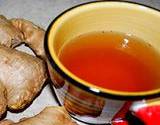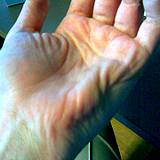|
Grandma's Ginger Tea Recipes &
|
 |  |  |
A warming brew, ginger tea is ideal for chasing away colds and chills. Familiar warm and flavorful, ginger has retained its popularity-medicinally and as a culinary spice for more than 400 years. The knobby and aromatic root of the ginger plant (Zingiber officinale) is probably best known as a digestive aid. It eases nausea, improves poor digestion, cleanses the colon and helps expel gas.
Ginger also stimulates the heart and blood vessels and helps to promote cleaning of the body through perspiration.
Ginger tea makes a handy cold remedy, especially if you drink it as soon as symptoms appear; it will soothe a sore throat and drive away chills.
Women in Asia have found ginger tea useful in alleviating menstrual cramps and discomfort. The herbal plant may also play a role in fighting cancer. Because of all its various medicinal powers, it is often included in herbal formulas to increase their overall effectiveness.
Caution: If you have a history of gallstones or if you plan to use ginger before surgery to combat postanesthesia nausea, consult your physician. Also, through useful for morning sickness, avoid extended use of large amounts of ginger during pregnancy.
Healing Herbal Tea Mixtures with Gingerroot
Preparation of Ginger Tea
To make ginger tea, pour a cup of boiling water over 1 teaspoon of dried gingerroot (or 2 teaspoons of fresh gingerroot). Steep for 10 to 15 minutes and strain. Sweeten with honey or lemon or both, if desired.
For digestive stimulant, boil a few slices of the ginger root in a cup of water and drink it 30 minutes before a meal.
- 1/2 teaspoon gingerroot
- 1/2 teaspoon clove blossoms
- 1 teaspoon chamomile flowers
Pour 1 cup of boiling water over the medicinal herbs, steep for 10 minutes and strain. Breathe in the steam to clam nausea. When the tea is cool, sip it slowly.
Herbal Tea Recipe for Relief of Raynaud's Syndrome or Warming Hands & Feet
- 1/2 teaspoon gingerroot
- 1/2 teaspoon dried cayenne
- 1/2 teaspoon prickly-ash-bark
Pour 1 cup of freshly boiled water over the herbs, steep for 10-15 minutes and strain. for best results, drink the tea while quite hot.
Morning Sickness
- 1/2 teaspoon gingerroot
- 1/2 teaspoon black horehound flowers and leaves
- 1/2 teaspoon chamomile flowers
Pour 2 cups of freshly boiled water over the herbs and steep for 15 minutes and strain. Sip slowly until symptoms subside. This tea may be stored for a few days in a covered container and reheated.
Gingerroot Tea & Medicinal Uses
Gingerroot has a Therapeutic Effect
The volatile oils contained in gingerroot are responsible for its action as a circulatory stimulant and an antispasmodic. It relieves nauseas, helps prevent vomiting and promotes expectoration. The root also encourages sweating, reduces fevers and assists the body in ridding itself of germs. topically, ginger can soothe aches and pains because it increases blood flow.
Aromatic Volatile Oils for Nausea
Hot, pungent ginger contains 1 to 4 percent volatile oils, including the medicinally active borneol and citral. These elements are the reason gingerroot has the ability to combat nausea and vomiting, including postsurgical nausea, morning sickness and motion sickness.
Ginger Tea for Relieving Muscles
Used topically in a hot compress, ginger tea increases blod flow to the area to chich it is applied. Use hot compresses on sore muscles or on a congested chest. Soak a compress in ginger tea and apply it while very hot.
Gingerroot Skin Tea Relieves Abdominal Bloating
A tea made from the skin of fresh gingerroot, rather from slices of the peeled root, may ease bloating and the fluid retention from edema. The gingerroot skin contains compounds that relax peripheral blood vessels and increase blood flow.
Ginger Improves Circulation
Ginger stimulates circulation, which is why it fights chills and warms cold hands and feet. Also, like garlic, ginger inhibits blood clotting and thus can help prevent arteriosclerosis.
Ginger Tonic Improves Digetstion
ginger is a classic tonic for improving digestion, easing the flow of food through the digestive tract and reducing irritation to intestinal walls. It many help protect the stomach from ulcers and some alcohol's damaging effects.
Ginger & Cancer Prevention
Ginger may be useful in the fight against cancer. Gingerroot is known to have antioxidant effects. It contains compounds that protect cells from excess free radicals, which can trigger the kinds of cell mutations that can lead to cancer. Ginger has also been shown to inhibit the growth of certain fungi that produce potent carcinogens.
DISCLAIMER:
The statements made here have not been approved by the Food and Drug Administration. These statements are not intended to diagnose, treat or cure or prevent any disease. This notice is required by the Federal Food, Drug and Cosmetic Act.
Return from Ginger Tea to Grandma's Medicinal Tea Guide
Return to Grandma's Wisdom Home





